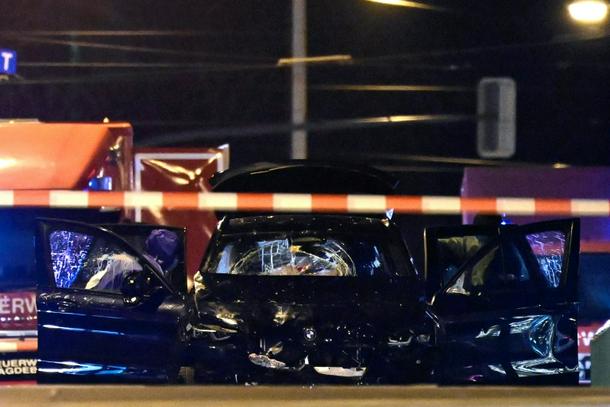
Forensics police inspect the car that rammed into the crowd at a Christmas market in Magdeburg
Berlin (AFP) - Germany’s far-right AfD was to march Monday in the eastern city mourning the victims of a car-ramming attack on a Christmas market that has newly inflamed a heated debate on migrant and security policy.
The government has faced angry questions on possible errors and missed warnings about the Saudi suspect arrested at the scene of Friday’s attack in Magdeburg that killed five people and left over 200 wounded.
Those concerns were fuelled by news that Saudi Arabia had warned Germany about its citizen Taleb al-Abdulmohsen, 50, who came to Germany in 2006 and was granted refugee status 10 years later.
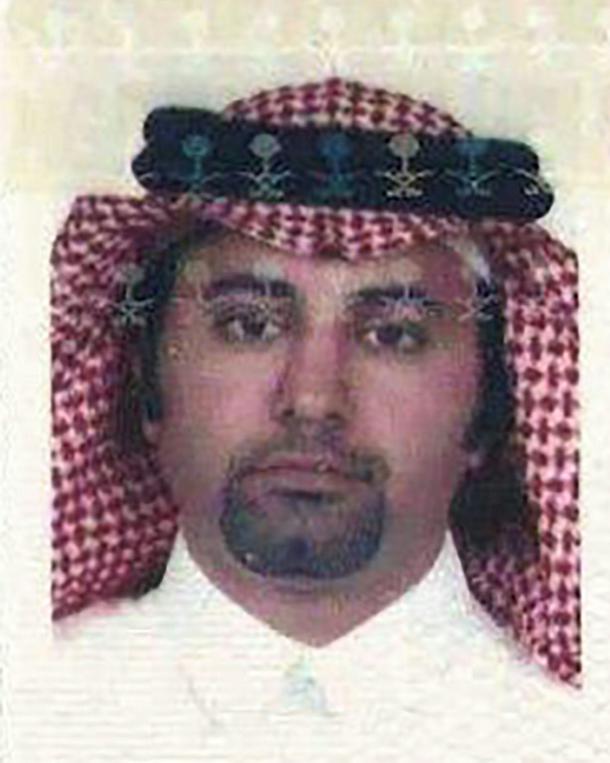
The Saudi secret service reportedly warned Germany's spy agency about Taleb al-Abdulmohsen a year ago
Riyadh had warned Berlin “many times” that the psychiatrist and activist “could be dangerous”, a source close to the Saudi government told AFP, adding that “there was (an extradition) request”.
Police were still puzzling over why the driver smashed a rented SUV at high speed through the crowd of revellers, bringing death and chaos to the festive event.
Abdulmohsen has in his many online posts voiced strongly anti-Islam views, anger at German authorities and support for far-right conspiracy narratives on the “Islamisation” of Europe.
Die Welt daily, citing unnamed security sources, reported on Monday that Abdulmohsen had been treated for a mental illness in the past, but this has not been confirmed by authorities.
The Saudi suspect has been remanded in custody in a top-security facility on five counts of murder and 205 of attempted murder, prosecutors said, but not so far on terrorism-related charges.
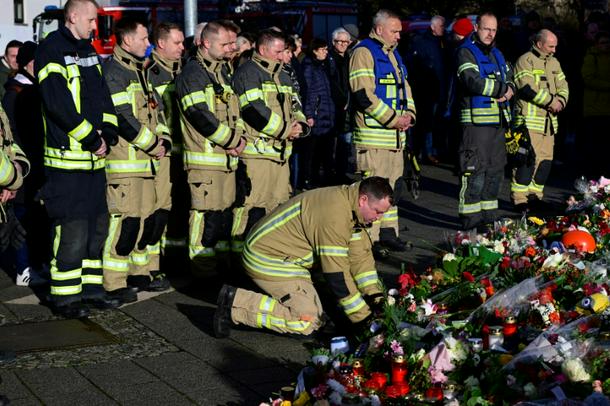
Members of Magdeburg's fire department at a makeshift memorial outside the Johanniskirche church in Magdeburg
Even as the attacker’s motive remained unclear, the deadly carnage has moved the flashpoint issues of security and immigration back to the centre of German politics ahead of February 23 elections.
The mass-circulation Bild daily wrote that “although the background to the terrible attack in Magdeburg has not yet been clarified, it is already clear: there will be a ‘before’ and an ‘after’ in this election campaign.”
- ‘Shocked and angry’ -
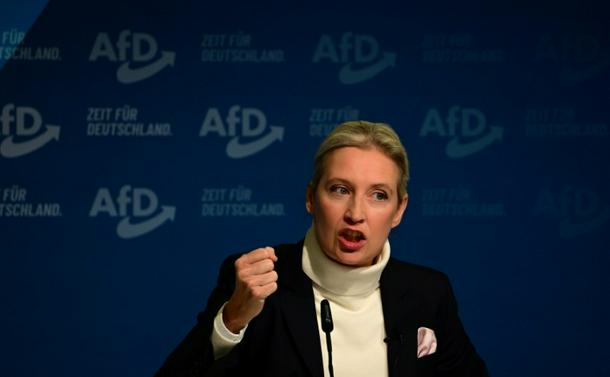
Alice Weidel, co-leader of Germany's far-right Alternative for Germany (AfD) party, was expected at a 'memorial' event in Magdeburg
The anti-immigration Alternative for Germany (AfD) party announced a public “memorial” event and march for the victims from 5:00 pm (1600 GMT) in Magdeburg, to be attended by its top candidate Alice Weidel.
Weidel charged on social media platform X that the attack “would not have been possible without uncontrolled immigration”.
“The state must protect citizens through a restrictive migration policy and consistent deportations!” demanded Weidel, whose party is polling at around 20 percent but has been shunned as a pariah by all other mainstream parties.
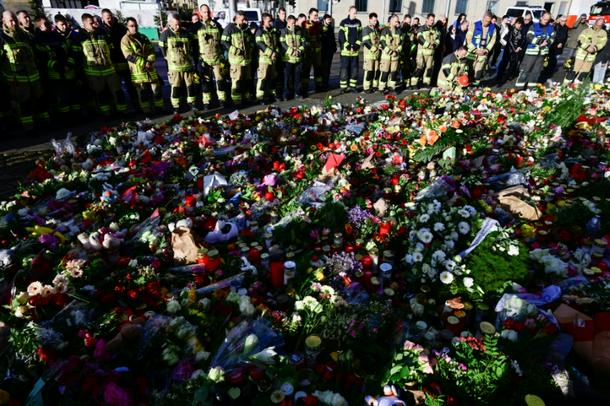
A sea of flowers, candles, cards and children's toys in Magdeburg, a city in mourning over the deadly attack
An anti-extremist initiative called “Don’t Give Hate a Chance” was to rally at the same time, near the city’s Johannis church, where thousands of flowers, candles and children’s toys have been placed for the victims – a nine-year-old boy and four women aged between 45 and 75.
“We are all shocked and angry to see that people want to exploit this cruel act for their own political ends,” the initiative said in a statement. “We must approach each other with openness, care, tolerance and humanity and build bridges instead of erecting walls in our hearts.”
- ‘Weakest link’ -
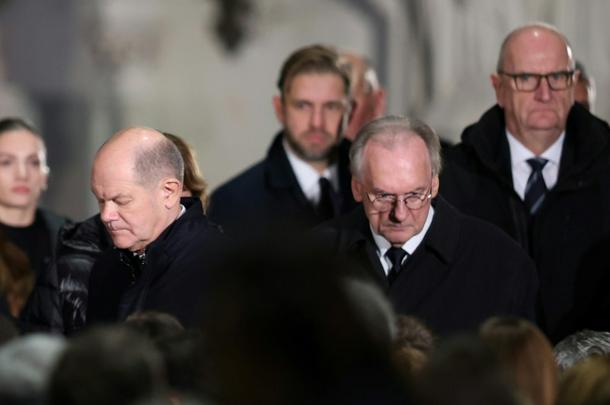
German Chancellor Olaf Scholz, on the left, at a church service for the victims of the attack
Chancellor Olaf Scholz’s government pledged Sunday to fully investigate whether there were security lapses before the attack.
Interior Minister Nancy Faeser vowed that “no stone will be left unturned” in shedding light on what information had been available in the past.
She stressed that the attacker did “not fit any previous pattern” because “he acted like an Islamist terrorist although ideologically he was clearly an enemy of Islam.”
The Association of German Criminal Police Officers warned that “it is still too early to draw hasty conclusions or even to formulate political demands.”
German Christmas markets – among the country’s most iconic and beloved festive events – have been specially secured since a jihadist attacker rammed a truck through a Berlin Christmas market in 2016, killing 13 people.
Police have also stepped up weapons checks following several deadly knife attacks, including one that killed three people and wounded eight at a summer festival in the western city of Solingen.
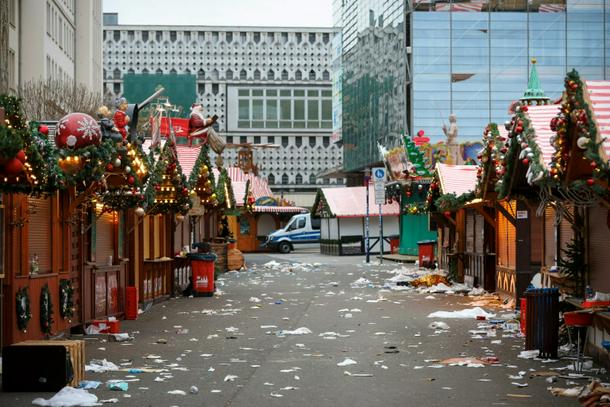
Debris and closed stalls seen on the day after the car-ramming attack
The suspect, a 26-year-old Syrian man with suspected links to the Islamic State group, had evaded authorities’ attempts to deport him.
The Magdeburg event too had been secured with police and barricades, but the attacker managed to exploit a five-metre gap when he steered his rented BMW sports utility vehicle into the site and then raced into the unsuspecting crowd.
“A security concept is only as strong as its weakest link,” counterterrorism expert Peter Neumann told news weekly Der Spiegel. “If one entry point remains unprotected, all the other concrete bollards are of no use.”
burs/fz/sr/fg